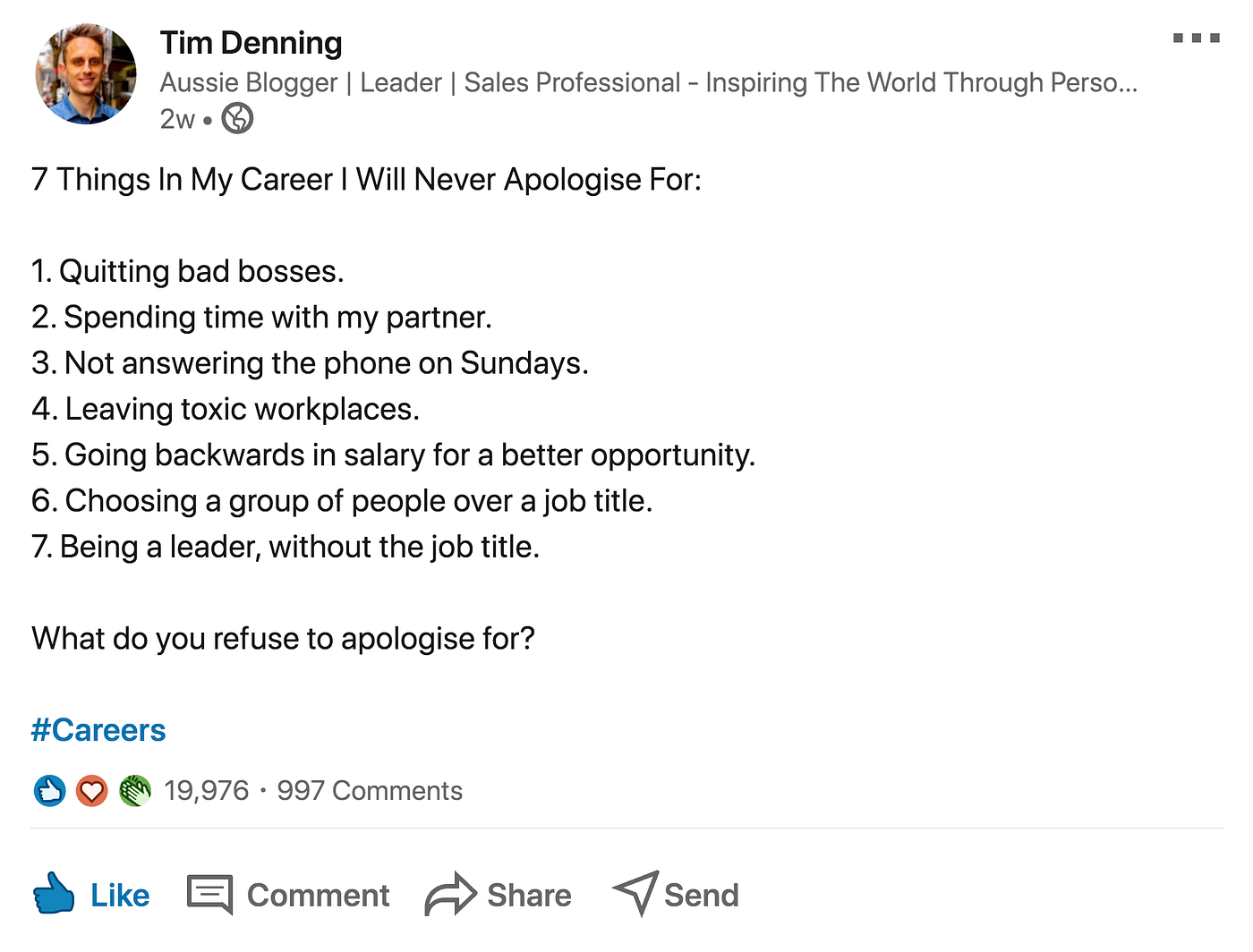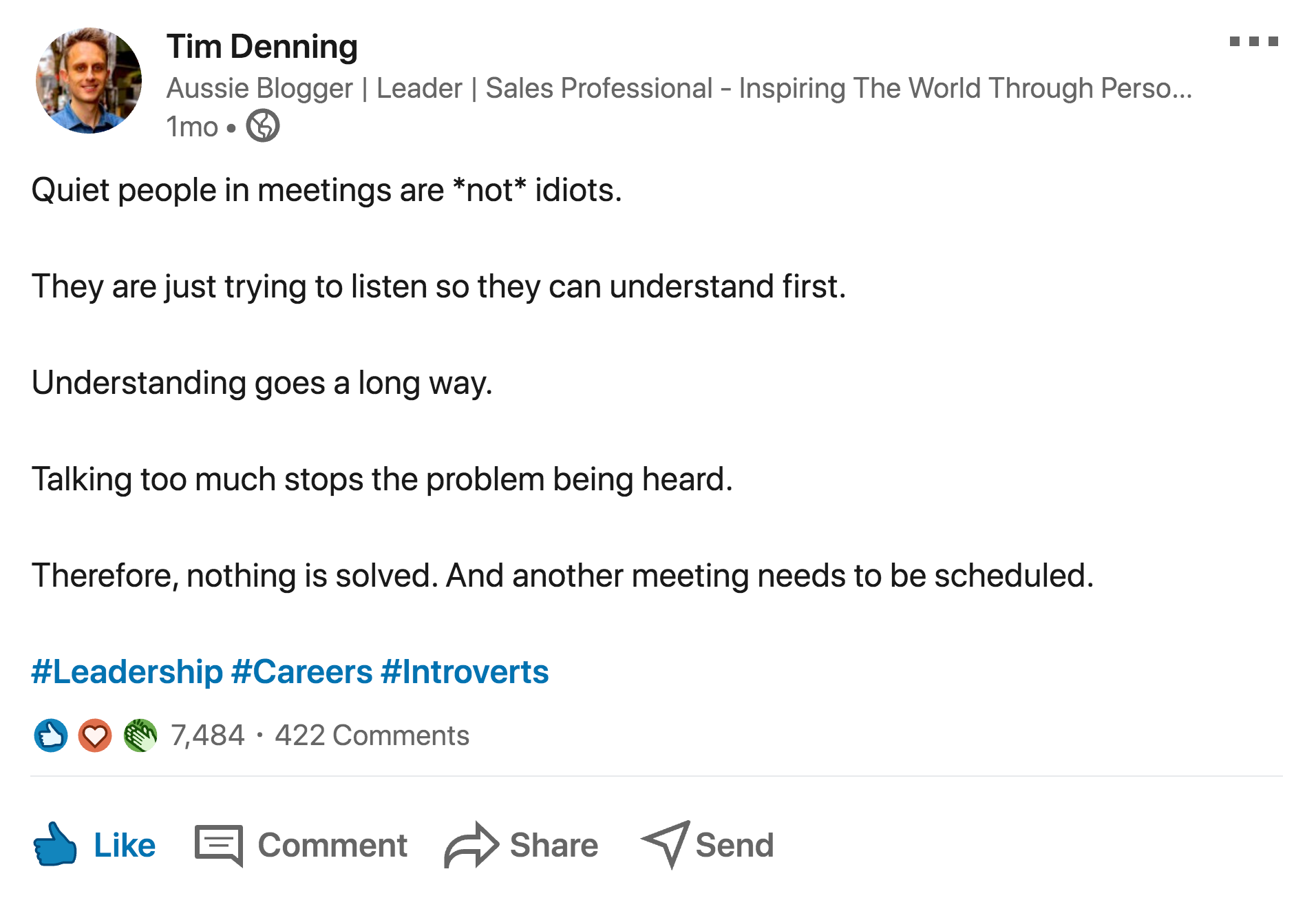This is a misconception that viral/popular content has to take a long time to create. That hasn’t been the case for me, or countless other creators.
Some of my most popular written posts of all time are less than 200 words. It seems this phenomenon isn’t unique to me. Content creator, Emilina Lomas, reports having the same thing happen and making $10,000 a month from it.
I’ve known this for a while but Emilina reminded me of it. Instagram is a photo app. Instagram is also a blogging platform. You can write blog posts as the caption for your image.
Writer, Nicolas Cole, figured out early on that you could write Quora answers as short blog posts too.
Places online that worship short content
- Twitter updates and Twitter Tweet Storms
- Quora (questions or answers)
- LinkedIn text-only posts
- Instagram captions
- Facebook Groups
Why is less than 200 words powerful?
People love short content because it’s concise.
Telling a story in only 200 words is an art.
Nicolas Cole calls it ‘the rate of revelation,’ a term I’d never heard. Most of my 200 word stories start out as longer pieces. The editing process is where I ruthlessly edit the story or thought down to 200 words or less. People appreciate that editing.
I have to make a decision about every word. If a sentence can be shorter, it must. If a point isn’t relevant to the story, it must be cut. If I have twenty golden sentences and the story is too long, I’m forced to eliminate sentences by rating each one out of ten.
Weak sentences don’t survive the final cut.
The time it takes is refreshing
I am busy. You are too. It takes me no more than 5–10 minutes to write and publish 200 word posts.
It’s the ultimate way to participate in the content-generating generation — who change their life in the process, and find their tribe.
Writing full-length blog posts can feel overwhelming. Writing short 200 word content is the answer. Start small and see if you can get longer. Or, like me, perhaps you will see you don’t ever have to write longer content at all. You can stick to 200 words or less for the rest of your life if you choose.
Quality of content has nothing to do with length.
Simple and helpful content will always have a place on the internet.
Short content can become 1000+ word posts later
Some of my most successful long-form blog posts started out as a lonely cluster of 200 words or less.
200 word content is a test. If people engage with your thought, expand on that thought. Make the sentences of your 200 word post into subheadings of a blog post and expand on each one.
Make the first sentence or the last sentence of your post the headline.
A/B testing is common in app development and marketing. Why couldn’t it work for us writers too? It can. My work is proof.
Examples of 200 word content to inspire you
All of this is meaningless information if you can’t see it in action. I’m a LinkedIn Lover Boy, so let me show you my darlings. (Oh, and I like my own posts. Self-love, I guess.)



Feeling excited yet by 200 word posts? There is so much power in short thoughts, and your thoughts have power too.
My Process — (you can copy, emulate, or steal)
- Write a thought/tip/story into a social media platform that restricts the number of characters. (Instagram or LinkedIn both restrict text length.)
- Treat the social media platform you write on like an editor only. You can take the text from where you type it and paste it elsewhere, later.
- Set your phone’s timer for 10 minutes. The time limit helps you focus and get to the point. Anything over 10 minutes means you’re overthinking it. You want stream of consciousness, not a bad hangover of writer’s block.
- Edit your text right after you write it. Format your text later.
- Add two hashtags. Hashtags force you to say to yourself “what two topics does this piece of writing fit?”
- Copy and paste your text into your favorite notes app (I use Apples’ Notes) so you can publish your work when you’re ready.
- Reply to the comments on your finished piece of work to gain feedback, learn, and show you care using social proof. If you’re afraid of opinions or being judged, completely ignore the comments. It’s fine.
- Repeat this process multiple times a week. I recommend Monday-Friday.
Bonus Pro Tip: Batch write everything
I find batching up similar tasks to work on is much faster. I spend 1–2 hours per week writing 200 word posts. They are stored in my notes app and published twice a day at 8 AM and 6 PM.
If you’re time poor this is a great strategy. Turn this process into a mini-marathon so you can get over your natural resistance to be creative.
You can also make 200 word posts your warm up. I write long-form blog posts two days a week. Sometimes I’ll use this process as a warm-up to get my brain into a flow state, and to get my fingers typing. You can write emails, post comments online, or text a friend as a writer’s warm-up too.
Final Thought
If I can do it, why not you? The drain on your time and emotions to produce brilliant, long-form, well-researched written content can be exhausting. You don’t have to opt into being a tired writer if you don’t want to.
Some of my best performing written content over the last 6 years took minutes to come up with, 10 minutes to write, and up to 12 hours to go viral.
Starting small is underrated. Staying small is even more underrated.
If you want to be a writer, or become a better writer, start by writing 200 word content and see where it takes you. You might be surprised by what short content can do for you.


